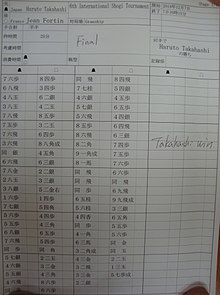This article has multiple issues. Please help improve it or discuss these issues on the talk page. (Learn how and when to remove these messages)
|

A board game record is a game record for a board game.
Kifu (棋譜) is the Japanese term for an abstract strategy game record. In China, people named this kind of record "qipu" (simplified Chinese: 棋谱; traditional Chinese: 棋譜; pinyin: qípǔ. In Korea, people named this kind of record "Gibo" (Chinese: 棋譜).
In go, board game records are traditionally used to record games on a grid diagram, marking the plays on the points and pieces.
Board game record databases can be useful to study board games. Many AI algorithms review a large database of professional games.